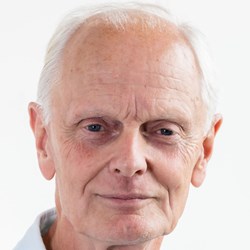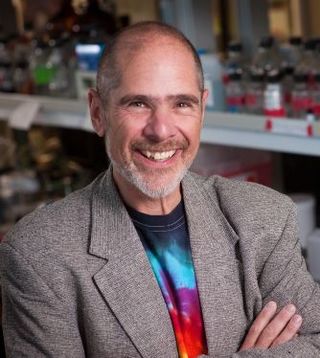Leslie D. Zettergren | |
|---|---|
| Nationality | American |
| Alma mater | |
| Title | Professor |
| Academic career | |
| Discipline | Biomedicine |
| Sub-discipline | Immunology, Amphibians, Birds |
Leslie D. Zettergren is an American biomedical researcher. [1] He was born in 1943.
Leslie D. Zettergren | |
|---|---|
| Nationality | American |
| Alma mater | |
| Title | Professor |
| Academic career | |
| Discipline | Biomedicine |
| Sub-discipline | Immunology, Amphibians, Birds |
Leslie D. Zettergren is an American biomedical researcher. [1] He was born in 1943.
He received a BS degree from Southern Illinois University and a PhD in Cell and Molecular Biology from Tulane University.
He was a faculty member at Carroll University in Waukesha, Wisconsin.
His research is focused on understanding the development of the amphibian and avian immune systems.

David Baltimore is an American biologist, university administrator, and 1975 Nobel laureate in Physiology or Medicine. He is a professor of biology at the California Institute of Technology (Caltech), where he served as president from 1997 to 2006. He founded the Whitehead Institute and directed it from 1982 to 1990. In 2008, he served as president of the American Association for the Advancement of Science.

Susumu Tonegawa is a Japanese scientist who was the sole recipient of the Nobel Prize for Physiology or Medicine in 1987 for his discovery of V(D)J recombination, the genetic mechanism which produces antibody diversity. Although he won the Nobel Prize for his work in immunology, Tonegawa is a molecular biologist by training and he again changed fields following his Nobel Prize win; he now studies neuroscience, examining the molecular, cellular and neuronal basis of memory formation and retrieval.
Ira Mellman is an American cell biologist who discovered endosomes. He served as Vice President of Research Oncology at Genentech in South San Francisco, California.
A biomedical scientist is a scientist trained in biology, particularly in the context of medical laboratory sciences or laboratory medicine. These scientists work to gain knowledge on the main principles of how the human body works and to find new ways to cure or treat disease by developing advanced diagnostic tools or new therapeutic strategies. The research of biomedical scientists is referred to as biomedical research.
Current Protocols is a series of laboratory manuals for life scientists. The first title, Current Protocols in Molecular Biology, was established in 1987 by the founding editors Frederick M. Ausubel, Roger Brent, Robert Kingston, David Moore, Jon Seidman, Kevin Struhl, and John A. Smith of the Massachusetts General Hospital Department of Molecular Biology and the Harvard Medical School Departments of Genetics and Biological Chemistry, and Sarah Greene of Greene Publishing Associates The Current Protocols series entered into a partnership with Wiley-Interscience, John Wiley and Sons, was acquired by Wiley in 1995, and continued to introduce additional titles. Scientists contribute methods that are peer-reviewed by one of 18 editorial boards. The core content of each title is updated quarterly, and new material is added. In 2009, the Current Protocols website was launched, with online versions of all of the texts, research tools, video protocols, and a blog. Several Current Protocols titles are indexed in MEDLINE and searchable by PubMed: CP Molecular Biology, CP Immunology, CP Cell Biology, CP Protein Science, CP Microbiology.

Philippa "Pippa" Marrack, FRS is an English immunologist and academic, based in the United States, best known for her research and discoveries pertaining to T cells. Marrack is the Ida and Cecil Green Professor and chair of the Department of Biomedical Research at National Jewish Health and a distinguished professor of immunology and microbiology at the University of Colorado Denver.
The Sir William Dunn School of Pathology is a department within the University of Oxford. Its research programme includes the cellular and molecular biology of pathogens, the immune response, cancer and cardiovascular disease. It teaches undergraduate and graduate courses in the medical sciences.
Thomas Fletcher Tedder was an American immunologist. He is best known for his work in the fields of B lymphocyte biology and regulation. He was the Alter E. Geller Professor for Research in Immunology at Duke University

Cell and Tissue Research presents regular articles and reviews in the areas of molecular, cell, stem cell biology and tissue engineering. In particular, the journal provides a forum for publishing data that analyze the supracellular, integrative actions of gene products and their impact on the formation of tissue structure and function. Articles emphasize structure–function relationships as revealed by recombinant molecular technologies. The coordinating editor of the journal is Klaus Unsicker.
Carlos Martínez Alonso, was born in Villasimpliz, in the province of León, on January 9, 1950. In 1974 he obtained a chemistry degree from the Universidad Complutense of Madrid. Four years later, in 1978, he obtained a Ph.D. in immunology by the same university. He was appointed President of the Spanish National Research Council (CSIC) from 2004 to 2008, and Secretary of State for Research in the Ministry of Science and Innovation from early 2008 to December 2009.

Philippe J. Sansonetti is a French microbiologist, professor at the Pasteur Institute and the Collège de France in Paris. He is the director of the Inserm Unit 786 and of the Institut Pasteur laboratory Pathogénie Microbienne Moléculaire.
Brigitta Stockinger, FMedSci, FRS, is a molecular immunologist in the Francis Crick Institute in London. Stockinger's lab focus on understanding how certain immune cells, called T cells, develop and function as well as investigating how diet and other environmental factors can affect the way the immune system works.

Terence Howard Rabbitts FRS FMedSci is currently Professor of Molecular Immunology at the Institute of Cancer Research, London.

Douglas Green, is an American biologist. He holds the Peter C. Doherty Endowed Chair of Immunology in St. Jude Children's Research Hospital. His research has focused on the process of active cell death and cell survival, extending from the role of cell death in cancer regulation and immune responses in the whole organism to the molecular events directing the death of the cell. Green was editor in chief of the journal Oncogene from 2009-2016, is a Deputy Editor of the journal "Science Advances" and the author of the book Cell Death, Means To An End.
Lorenzo Galluzzi is an Italian and French cell biologist best known for his experimental and conceptual contributions to the fields of cell death, autophagy, tumor metabolism and tumor immunology.

Erica Ollmann Saphire is an American structural biologist and immunologist and a professor at the La Jolla Institute for Immunology. She investigates the structural biology of viruses that cause hemorrhagic fever such as Ebola, Sudan, Marburg, Bundibugyo, and Lassa.
David M. Mosser is an American researcher, academic and author. He is Professor of Cell Biology and Molecular Genetics at University of Maryland and the Director of Maryland Pathogen Research Institute. Mosser’s research is primarily in the field of immunology. He is most known for the discovery and characterization of macrophages with anti-inflammatory and growth-promoting activity, termed regulatory macrophages. He has written over 150 articles in scientific journals that have been cited over 25,000 times.
Edgar Pick is an Israeli immunologist who is Professor Emeritus of Immunology in the Department of Clinical Microbiology and Immunology at the Faculty of Medicine at Tel Aviv University, Israel.